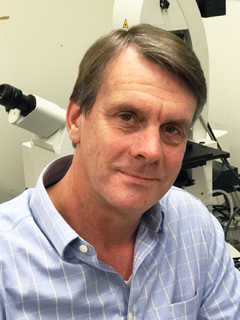HOW CAN WE HELP YOU? Call 1-800-TRY-CHOP
In This Section

Dr. Anderson’s research interests focus on the molecular and cellular mechanisms that govern the development of the mammalian forebrain. In his research on the development of the cerebral cortex, he is particularly interested in understanding the molecular underpinnings behind the fate determination and axon targeting of subclasses of GABAergic interneurons implicated in the neuropathology of schizophrenia.
Bio
Dr. Anderson serves as director of research in the Department of Child and Adolescent Psychiatry and Behavioral Services and associate director of the Lifespan Brain Institute, a CHOP-Penn collaboration dedicated to identifying the neuropathological antecedents of neuropsychiatric disease.
He has a longstanding interest in the interface between basic science and clinical research, and his research has involved the development of the cerebral cortex and schizophrenia.
Dr. Anderson's current research involves the molecular and cellular mechanisms that govern the development of the mammalian forebrain. Using mouse genetics, forebrain slice and dissociated culture techniques, as well as mouse and human embryonic stem cells in cell culture and transplantation experiments, he and his lab team study the development of the cerebral cortex. They are particularly interested in understanding the molecular underpinnings behind the fate determination and axon targeting of subclasses of GABAergic interneurons implicated in the neuropathology of schizophrenia.
New research directions by Dr. Anderson and his lab include the study of mitochondria in interneuron migration, maturation, and function. In addition, they are generating mouse and human stem cell-derived interneurons for use in cell-based therapies for seizures, psychotic disorders, and as tools for the study of gene-gene and gene-environment interactions in neuropsychiatric disease.
Education and Training
BA, Amherst College (Neuroscience), 1984
MD, University of Connecticut School of Medicine, 1989
Fellowship, University of California, San Francisco (Neurogenetics), 1998
Titles and Academic Titles
Director of Research, Department of Child and Adolescent Psychiatry and Behavioral Services
Associate Director, The Lifespan Brain Institute of Children’s Hospital of Philadelphia and University of Pennsylvania Perelman School of Medicine
Co-Leader, Developmental Biology Research Affinity Group
Professor of Psychiatry
Professional Memberships
Society for Neuroscience, 1993-
Brain and Behavior Research Foundation (formerly NARSAD), 2009-
Professional Awards
Freedman Award, National Alliance for Research in Schizophrenia and Affective Disorders (NARSAD), 1999
American College of Neuropsychopharmacology Travel Award, 1999
Future Leaders in Psychiatry Award, Emory University, 2002
National Alliance for Research in Schizophrenia and Affective Disorders Young Investigator Award, 2002
Freedman Award, NARSAD, honorable mention, 2006